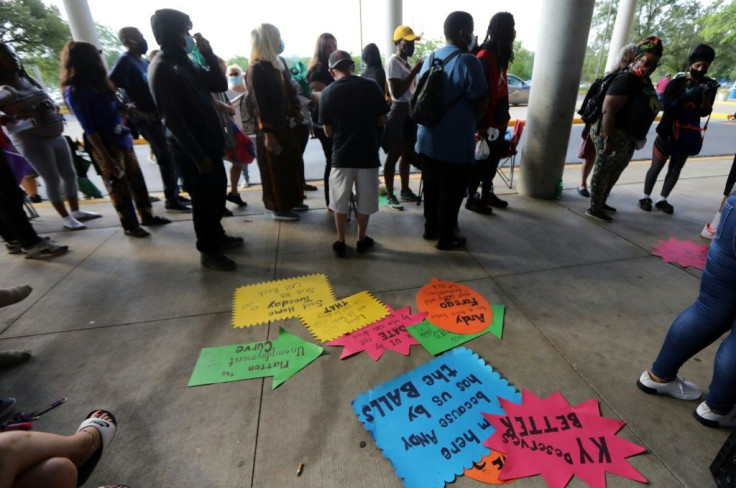US Sees Jobless Claims Rise Again As Lawmakers Debate Aid
Newly unemployed Americans filed nearly 1.42 million claims for jobless benefits last week, reversing recent months of decline as the world's largest economy grapples with a surge in coronavirus cases.
The worse-than-expected Labor Department data comes as lawmakers in Washington debate whether to extend additional weekly payments made to unemployed people provided under the $2.2 trillion CARES Act passed in March as businesses shut down to stop the spread of COVID-19.
Those closures prompted a spike in new weekly jobless benefit claims, which peaked at 6.9 million in late March but declined to 1.3 million earlier this month -- a figure nonetheless more than twice any single week of the global financial crisis 12 years ago.
But the coronavirus is surging again nationwide with nearly 64,000 new cases reported in the 24 hours to Wednesday, according to Johns Hopkins University, and some areas are pausing or rolling back reopening measures.
The rise in claims in the week ended July 18, together with the reported 974,999 people who applied for benefits under a program for workers who would not normally be eligible, adds to fears that the United States' tentative recovery from the downturn is stalling.
"The overall message is that an economy able to recover well is stalling due to health concerns," Mohamed A. El-Erian, chief economic advisor at Allianz, said on Twitter.
The Labor Department survey also contained evidence that some of the jobless were returning to work.
In the week ended June 11, the insured unemployment rate indicating people actually receiving benefits declined 0.7 points to 11.1 percent. In total, more than 31.8 million people were receiving benefits in the week ended July 4, the report said.
White House economic advisor Larry Kudlow pointed to the drop in insured unemployment as well as a slight decline in the four-week moving average of claims as evidence that the economy was on the mend.

"I don't see any breaking of the downward trend for unemployment and the upward trend for job creation. We're reasonably optimistic about July," Kudlow told Fox Business Network.
Democratic and Republican lawmakers are meanwhile negotiating over the fate of the $600 weekly payment the CARES Act provides to the unemployed, which is in addition to benefits from their state of residence.
Those payments will expire at the end of July. Democrats controlling the House of Representatives in May passed a measure extending the payments through the end of the year but the Republican-led Senate must agree, and it has shown no such inclination.
In an interview with CNBC on Thursday, Treasury Secretary Steven Mnuchin said President Donald Trump's administration was opposed to extending the payments beyond the end of the month.
"We're not going to continue it in its current form because we're not going to pay people more money to stay at home than work," Mnuchin said. "But we want to make sure that the people that are out there that can't find jobs do get a reasonable wage replacement."
The government instead favors a solution providing wage replacement of 70 percent, in addition to tax credits to spur hiring, he said.
Some of the states seeing the biggest jumps in joblessness were also among those with the highest number of coronavirus cases, including Florida, where claims jumped 65,890 in the week ended July 11, and Georgia, where they rose 33,292, the Labor Department said.
Rubeela Farooqi of High Frequency Economics tied the jump in claims to the surge in cases, and warned that the continued turmoil poses dangers for businesses who've seen their day-to-day activity curtailed.
"Businesses are once again closing and layoffs are rising. The risk from repeated business closures is that temporary job losses will become permanent. This could result in an even slower pace of recovery," she said.
© Copyright AFP 2024. All rights reserved.





















